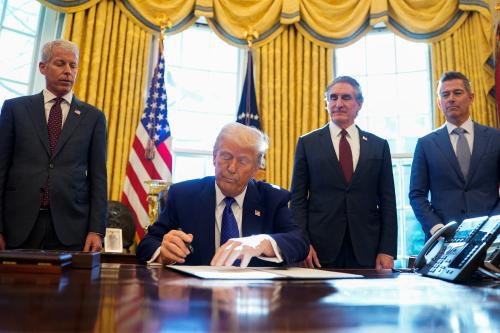This Atlantic Council-Thomson Reuters publication is also available at The Atlantic Council website.
INTRODUCTION
Two years after the collapse of Lehman Brothers
sparked a meltdown of the global financial system,
we are at a crucial point that calls for us to step
back and examine our progress in the effort to redesign the
rules governing global financial markets. The immediacy of
the crisis has passed, allowing for clearer analysis of the
manifold causes and an evaluation of how the reforms that
have been put in place match up with those causes. At the
same time, the urgency of the process has not yet entirely
dissipated and it is not too late to fill in any holes or to resolve
conflicts created by differing approaches around the world.
It is good that real progress has been made. Comprehensive
legislation has passed in the US and major pieces of
legislation have passed in Europe, with more on the way.
However, regulators have many important decisions to
make, particularly in the US, and the remaining legislative
agenda in the European Union (EU) includes critically
important items. As the financial crisis recedes, there will be
forces pushing for at least some essential reforms to be put
off, watered down, or abandoned.
This is in part because of remaining disagreements over
the best rules for the financial system; no legislation is ever
perfect and the same issues that fueled such intense debate
in crafting the current solutions will now be shifted to the
more opaque world of regulatory action. This is set against
a fundamental and profound change in the approach to
financial markets. After all, it was not so long ago that
deregulation was the order of the day. This latter point is a
reminder that financial regulation is a work in progress that
will necessarily evolve over time. We need the right initial
framework and processes to maximize the chance that
future changes are helpful and not harmful.
There has been a great deal of progress and global
partnership in laying the foundation for managing the
worst of the fallout that has plagued the global economy
since 2007. The process is by no means complete, but
the attention to the challenge and the level at which it has
been addressed is truly significant. Leaders of the Group of
Twenty (G-20) met four times in 14 months – and will meet
for a fifth time in November – on a single, all-consuming
issue. They moved rapidly, establishing the G-20 as the
manager of the global response, and acted together to stem
the cascading financial chaos that unfolded over 2008 and
2009 (see Appendix C for a summary of the relevant action
steps endorsed by the G-20).
This report focuses on defining the major issues for
transatlantic cooperation in their global context, analyzing
the effects of proposed rules on the US and European
economies, including the impact on the real economy
and especially the business sector, and outlining concrete
recommendations for policymakers. To do this, the report
addresses the following questions:
- What core principles should guide any recommendations
on financial reform? - How do financial systems and market roles
differ globally? - Was this just a “North Atlantic Crisis” requiring only
a North Atlantic solution and that can be ignored
elsewhere? - What are the institutional processes of the US and
European governments that drive decisions on
financial regulation? - How is international coordination being organized?
- What were the causes of the financial crisis?
- What is being done on each side of the Atlantic to
fix the causes of the crisis? - What transatlantic regulatory conflicts need to be
resolved and what differences are acceptable? - How will regulatory reform affect the economy?
- How can financial reform efforts best be improved
or extended?
The Atlantic Council, in partnership with Thomson Reuters,
assembled a task force of experts from academia, think
tanks, and the private sector, as well as government
representatives, to discuss financial market reform and
the state of transatlantic cooperation. Task force members
provided information and perspectives on the issues
covered in the report.
The views expressed in this report are inspired by
conversations with the rapporteur and do not constitute
a consensus view from the task force or a view from its
individual members. Nor do the views expressed here
necessarily represent the views of the Atlantic Council or
Thomson Reuters.
Executive Summary
Transatlantic leadership is essential to complete
the process of global financial reform. The good
news is that the trend of transatlantic cooperation
is clearly quite positive compared to pre-crisis days. For
example, the degree of international controversy over
Sarbanes-Oxley was vastly higher than the relative comfort
with the Dodd-Frank regulatory reform bill recently passed
in the US. Current reform efforts are also addressing
serious failures in regulatory cooperation, including a
failure to consult effectively across borders about systemic
risks and to exchange detailed information about such
risks and the maintenance of substantially different capital
standards for banks in the US versus the rest of the world.
Yet there is a great deal left to do, and leadership from
the US and Europe is especially important now, since,
surprisingly, the easiest work of the G-20 may be
behind it. As countries begin to concretely define their
regulatory plans, it becomes harder to paper over some
very real differences that were obscured by the urgency
of managing the crisis. Yet, the need for cooperation is
similarly at its highest. This report is timed to encourage
continued emphasis on the need for international
cooperation and, crucially, to urge the transatlantic
community to continue leading this effort.
We offer a number of suggestions to improve the process
and outcome of financial reform, listed below. These are
explained in greater detail in the Recommendations section.
Finish the key regulatory reforms
There are a large number of issues that remain to be
completed, including the writing of a substantial number of
regulations. The Dodd-Frank bill alone has hundreds of rulemakings
that are the province of many different regulatory
bodies. In addition, there are some major outstanding
issues that can only be handled either by international
bodies, or domestically within the US or EU member states.
It is essential to maintain momentum on these reforms.
- Finalize the Basel III accord without sacrificing
its strength - Design reforms to achieve the necessary safety
at the lowest economic cost - Jointly engage major Asian countries and
other emerging markets in financial reform - Harmonize the regulation of financial market
infrastructure - Fix the housing finance system in the US
- Address the underlying macroeconomic,
social, and political causes of the crisis - Stay focused on key unresolved structural issues
Resolve transatlantic conflicts
There are a small number of conflicts between the US
and EU that are particularly troublesome. These tend to
center around different underlying beliefs in the purpose
of government, the market, and regulation. It is best
to address them head-on. It is unlikely this will change
the underlying beliefs of either side, but an honest
conversation about the conflict is the only way to find
solutions that mitigate differences.
- Demand that consistent global accounting standards
be applied by all parties - Find compatible approaches to regulating hedge funds
and private equity funds - Coordinate approaches to credit rating agencies
Repair the supervision process
There is also a subset of issues that both sides agree are
essential, but that are fundamentally vexed questions.
Unfortunately, these also happen to be areas that are
most likely to lead to another crisis if not resolved.
- Improve banking supervision and hold regulators
accountable - Create effective rules for dealing with cross-border
banks that run into trouble
Enhance the processes for global cooperation
The coordination processes at the international,
transatlantic, and bi-lateral levels are present, but vary
greatly in quality and content. There is a strong need to
deepen, better structure, and better coordinate a number
of these efforts.
Engage Congress and the EU Parliament more deeply in
international discussions of reform
- Establish better forums for discussions of transatlantic
financial reform issues among all parties - Define a clear, robust future for the G-20, linked to
existing multilateral institutions - Coordinate macroprudential policies globally
- Coordinate carefully any significant changes in taxation
of financial institutions or transactions
The Brookings Institution is committed to quality, independence, and impact.
We are supported by a diverse array of funders. In line with our values and policies, each Brookings publication represents the sole views of its author(s).




